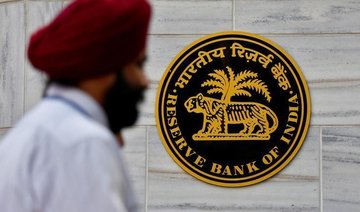LONDON: The aggregate value of all cryptocurrencies hit a record high of over $200 billion on Wednesday, according to industry website Coinmarketcap, putting their reported market value at more than that of US banking giant Citigroup.
The new record came as the biggest and best-known cryptocurrency, bitcoin, hit a record high of $7,500 on the Luxembourg-based Bitstamp exchange, after a more than tenfold increase in value over the past 12 months.
That took its own “market cap” — its price multiplied by the number of coins that have been released into circulation — to a record high of more than $120 billion.
The second-biggest cryptocurrency, ether — sometimes known as “Ethereum” after the project behind it — has a market cap of just below $30 billion, with another 1000 or so rival digital currencies making up the rest of the $200 billion.
If the cryptocurrency market were a company, its valuation would put it in the top 25 firms on the S&P 500 stock index.
The latest surge in bitcoin was driven by news this week that CME Group, the world’s largest derivative exchange operator, would launch bitcoin futures in the fourth quarter of the year, as well as speculation that Amazon could be set to accept the digital currency.
Many are concerned that the market represents a bubble, with the latest warning coming from the head of Credit Suisse on Thursday.
Cryptocurrencies’ market cap hits record $200 billion as bitcoin soars
Cryptocurrencies’ market cap hits record $200 billion as bitcoin soars

Saudi Arabia’s foreign reserves rise to a 6-year high of $475bn

RIYADH: Saudi Arabia’s foreign reserves climbed 3 percent month on month in January to SR1.78 trillion, up SR58.7 billion ($15.6 billion) from December and marking a six-year high.
On an annual basis, the Saudi Central Bank’s net foreign assets rose by 10 percent, equivalent to SR155.8 billion, according to data from the Saudi Central Bank, Argaam reported.
The reserve assets, a crucial indicator of economic stability and external financial strength, comprise several key components.
According to the central bank, also known as SAMA, the Kingdom’s reserves include foreign securities, foreign currency, and bank deposits, as well as its reserve position at the International Monetary Fund, Special Drawing Rights, and monetary gold.
The rise in reserves underscores the strength and liquidity of the Kingdom’s financial position and aligns with Saudi Arabia’s goal of strengthening its financial safety net as it advances economic diversification under Vision 2030.
The value of foreign currency reserves, which represent approximately 95 percent of the total holdings, increased by about 10 percent during January 2026 compared to the same month in 2025, reaching SR1.68 trillion.
The value of the reserve at the IMF increased by 9 percent to reach SR13.1 billion.
Meanwhile, SDRs rose by 5 percent during the period to reach SR80.5 billion.
The Kingdom’s gold reserves remained stable at SR1.62 billion, the same level it has maintained since January 2008.
Saudi Arabia’s foreign reserve assets saw a monthly rise of 5 percent in November, climbing to SR1.74 trillion, according to the Kingdom’s central bank.
Overall, the continued advancement in reserve assets highlights the strength of Saudi Arabia’s fiscal and monetary buffers. These resources support the national currency, help maintain financial system stability, and enhance the country’s ability to navigate global economic volatility.
The sustained accumulation of foreign reserves is a critical pillar of the Kingdom’s economic stability. It directly reinforces investor confidence in the riyal’s peg to the US dollar, a foundational monetary policy, by providing SAMA with ample resources to defend the currency if needed.
Furthermore, this financial buffer enhances the nation’s sovereign credit profile, lowers national borrowing costs, and provides essential fiscal space to navigate global economic volatility while continuing to fund its ambitious Vision 2030 transformation agenda.












